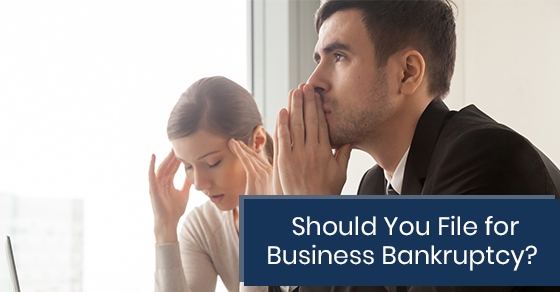Contemplating commercial business bankruptcy is difficult and stressful. The majority of people have invested significant sums into and thousands of hours into their business and commercial business bankruptcy is on par with losing a loved one or facing a major illness when it comes to stress.
Options Before Commercial Bankruptcy
Even though the pressure feels as though it is enormous and there seems to be no way out, there are sometimes other options besides bankruptcy. It’s always good to discuss your situation and run through your options with a licensed trustee. It may turn out that you do not need to declare bankruptcy.
If you are having financial difficulties, and are considering filing for bankruptcy, first consider other options. For example, you ideally you should put forward a payment plan and explain to them in detail how you intend to repay them. If your creditors agree, you won’t need to declare commercial business bankruptcy and, with careful planning and preparation, you may be able to continue with your business.
You can also discuss with your creditors that you may want to look at selling your assets, re-do your budget, or sell some of your business’ assets to lighten the debt load.
Another more formal option is to file a Division 1 Proposal, sometimes called a business proposal. Such a proposal is an arrangement to repay what you owe to creditors without actually declaring bankruptcy. It is similar to a consumer proposal but allows you and your licensed insolvency trustee to deal with higher amounts of money.
A Division 1 Proposal means that you will be required to work with a licensed insolvency trustee and pay creditors a portion you can afford over a set period of time. A Division 1 Proposal is available to individuals with debt higher than $250,000, excluding what is owned on your main residence.
Try to Improve Your Finances First
At times there are small to medium-sized businesses that are profitable but have hit a hard patch. Again, a licensed insolvency trustee can help you resolve this kind of issue and help you get your business back on sound footing.
One of the biggest issues that affect a business is slow cash flow, mostly caused through late payments by clients who owe you money. You can insist that your invoices be paid on time, or hire a bookkeeper who sends out regular reminders and makes frequent calls to debtors.
Managing your business in an economic downturn is an important thing to learn. If your cash flow is good, your business can still be affected negatively if an economic downturn or uncertain plays out. Ways to prepare for this are keeping expenditures as lean as possible and being able to offer special offers or discounts during this time. An accountant and marketer can help you with these strategies.
Do you own a proprietorship or in a partnership?
If your business is a sole proprietorship or a partnership, your business assets cannot be held separately from your personal assets. It’s important to be aware of this fact because of the implications; small business bankruptcy in this situation is the same as personal bankruptcy.
By declaring bankruptcy, in effect, you surrender all your inventory and possessions to a licensed insolvency trustee. In return, you are legally free of your debts; they have been eliminated. You also get a chance to begin again. A key requirement of this is that you report your income to your licensed trustee on a monthly basis. However, despite your new start, your credit report will be affected so if in the future you want to take out a loan, this will not be easy.
Alternatively, you will have liability protection if your business is incorporated are by law, because it is viewed as an independent legal entity.
Commercial Business Bankruptcy
For some business, deciding to declare commercial business bankruptcy might be the only way forward. However, you must read about all your options and discuss your decision with a licensed business bankruptcy trustee. It’s unwise to make this decision all alone, especially if you are feeling stressed, anxious, or very tired.
Bankruptcy is the main option when your business fails and you are unable to pay bills. Once you have reached the decision with professional support. Acting quickly means that creditors cannot take your inventory or your assets to cover the debts you owe them. They will also be unable to take any of your wages. In a situation when bankruptcy has been declared, your licensed insolvency trustee will handle assets and sell them so that payments can be made to your creditors.
Starting Again After Commercial Bankruptcy
Once you have declared commercial business bankruptcy and have paid your creditors through your licensed insolvency trustee, you may decide that after a time you want to begin another business. If you do make this decision, it’s important to access advice and tools from the beginning, so that whatever problem pulled your business down in the past does not rise again. Or, if it does, you will be capable of dealing with it.
Most provinces and some larger municipalities have programs and courses to help you access the knowledge you need to begin running your own business again. You can also consider taking night classes are a local community college or seeking out a business advisor at your bank.
For more information about business bankruptcy, call Kevin Thatcher at 1-888-329-5198 or contact us here.

